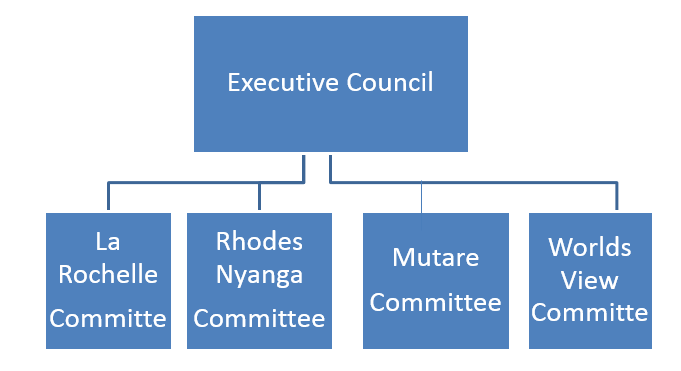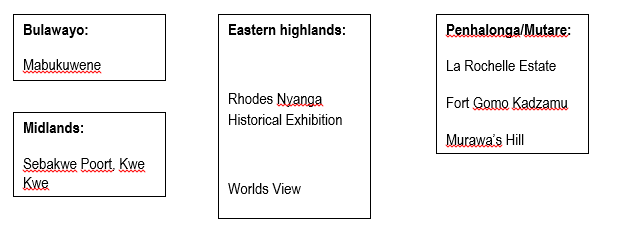THE NATIONAL TRUST OF ZIMBABWE
The National Trust of Zimbabwe was established in 1960 by an Act of Parliament – the “National Trust Act” – which states that it is “for the purpose of accepting and holding property in trust for public purposes, of acquiring and thereafter preserving and protecting for the benefit of the people of Zimbabwe land, buildings, natural resources, fauna, flora and objects of any description which have a national, archaeological, historical or aesthetic interest…”
Mission Statement
‘To be the custodians of those properties and sites of cultural heritage and natural beauty which we hold in trust and to maintain and manage them for the benefit and enjoyment of the people of Zimbabwe and our friends now, and as a legacy for future generations.’
a similar sister organization, The National Trust of Zimbabwe was established in 1960 by the National Trust Act with the same aim of protecting and managing properties for future generations to enjoy.
Some of our properties are held in perpetuity so that their future protection is secure. The others are open to visitors and we are constantly looking at ways in which we can improve public access and on-site facilities.
Overall Aims and Objectives of the Trust
The aims and objectives of the NTZ are as follows:
(a) to accept and hold property in trust for any public purposes and to act in trust for or as Trustee of any property devoted to public purposes in accordance with the conditions of such trust;
(b) to promote for the benefit of the people of Zimbabwe the permanent preservation and protection of :
i). lands and buildings of national, archaeological, historical or aesthetic interest; natural resources, animal or bird life and trees or flora;
ii) objects or collections of objects of any description having national, archaeological, historical or aesthetic interest, including furniture, works of art, stamps and literature;
(c) to provide the public with access to and enjoyment of the lands, buildings, resources and objects mentioned in (b) above;
(d) to maintain or manage or assist in maintaining or managing lands and buildings for the purpose of public recreation, entertainment, resort or instruction.
The NTZ Governing Body
The National Trust act is assigned to the Minister of Environment, Water and Climate Change. It is administered and controlled by a voluntary Council consisting of a President and not less than 10 or more than 20 members of whom not more than 18 are elected at an annual general meeting of members and three are appointed by The Ministry.
The Structure of the NTZ
The NTZ operates using a two level structure, as follows:
The Executive Council acts as the overall governing body
Four Regional Committees manage their portfolio of properties
Ie membership, sales, marketing, finance, media and so on
 A part-time honorary secretary and a part-time bookkeeper manage the NTZ’s headquarters in Harare.
A part-time honorary secretary and a part-time bookkeeper manage the NTZ’s headquarters in Harare.
An external auditor is appointed with the approval of the Minister of Environment, Water and Climate Change and audited accounts are submitted to the Ministry on an annual basis.
NTZ Properties
The Trust controls a total of seven properties: both built and natural environment that are located all around Zimbabwe. With the help of its Council, its employees and a number of unpaid volunteers the Trust manages the following properties:
Services offered
Services that are offered by the NTZ, at various sites, include the following:
• Environmental – Birding, Indigenous trees/fauna/flora, Aloes/Orchids, different species of butterflies, beetles, moths and dragonflies, woodland/mountain walks
• Tourism – Accommodation, Event hosting (small conferences, weddings or company retreats), camping and caravanning, existence of the only Braille trail in Zimbabwe, for the enjoyment of partially blind people to experience nature.
• Education – Historical – Exhibitions of Manyika African culture, early European contacts, fallen heroes and tribal chiefs and Viewing historical sites i.e. the Ziwa Iron Age settlement
Funding
Sources of funding for the NTZ include rents, annual subscriptions, donations and gequests, admission charges to properties, hire charges for the use of halls and grounds, and the proceeds of sales of nursery plants and cut flowers.
Staffing
A part-time honorary secretary and a part-time bookkeeper manage the NTZ’s headquarters in Harare. An external auditor is appointed with the approval of the Minister of Environment, Water and Climate.
Membership Benefits
Being a member of the NTZ has benefits both inside the country as well as around the world.
In Zimbabwe:
The Trust has a growing membership. Members enjoy the following benefits:
- Free entrance to NTZ properties in Zimbabwe
- Quarterly E-newsletter
- Discounted tickets for selected productions at Reps Theatres
- Free entry to National Galleries
- 10% off a Scotty Photographic Session
- 10% off selected rugs/throws at Hayhill Weavers
In the United Kingdom:
The NTZ has reciprocity agreements with the National Trust of England, Wales and Northern Ireland and the National Trust of Scotland. In terms of our arrangements with these Trusts, members are entitled to free admission to all of the many outstanding National Trust properties throughout England, Wales, Northern Ireland and Scotland upon production of a valid National Trust of Zimbabwe membership card. This represents a considerable benefit to members of the Trust who visit the United Kingdom.
Worldwide:
Through reciprocal arrangements with the National Trusts in Guernsey, Jersey, Barbados, Ireland, Malaysia, Bahamas, Bermuda and New Zealand and with the Australian Council of National Trust’s, and the Stichting het Vrienden der Geldersche Kasteelen and Stichting het Geldersch Landscape in the Netherlands Trust members enjoy free admission to the numerous properties of the National Trusts in those countries.
Annual Report:
Please find the NTZ Audited Annual Account Report for the 2014 period.







 USE NUMBER: 0775 907 595
USE NUMBER: 0775 907 595